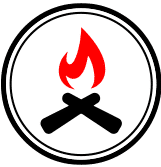General trail etiquette
Know & follow the rules
- Stay on the marked trail and do no trespass.
- Follow all trail signs.
- Do not use trails that are closed or do not permit your user type.
Be courteous
- Travel in single file or take up no more than half the trail.
- Step off the trail when taking a break.
- Travel at a safe and controlled speed.
- Be mindful of space and noise level.
- Keep children close by and teach them to be courteous trail users.
- Always yield to slow users, uphill traffic and HORSES.
Communicate
- Give an audible warning before passing and if necessary, communicate how to pass.
- Don’t tune out. Always be alert and able to hear other trail users.
- Use proper hand signals when verbal communication is not effective.
- Greet fellow users with a smile, nod, wave or a friendly hello.
- Common phrases used on the trail.
Pet etiquette
- Keep pets on a leash and under control at all times..
- Keep pets close by when other trail users are close or passing.
- Pick up after your pet.
Be a good steward
- Dispose of all waste properly.
- Do not disturb wildlife and their habitats.
- Respect all trail infrastructure or natural and cultural resources.
- Leave what you find for others to enjoy.
Trail safety tips
- Know before you go. Be prepared for weather, bugs, hunting seasons, etc.
- Walk, run, or ride within your limits.
- Use the buddy system whenever possible.
- When traveling alone, tell others of your plans.
- Wear a helmet and other applicable safety gear.
- Stay hydrated. Bring clean water or know the closest reliable source of clean water.
- If you use a motorized vehicle, bring tow ropes.
- VIDEO: Wear Your Helmet!
Trail etiquette for specific trail types
Common phrases used on the trail
Trail users must clearly communicate with other users in order to effectively share the trail. Communication can take many forms. Here are a list of common phrases to use and pay attention to.
- On your left - Alerts other trail users you are coming up behind them and will be passing them on their left in a little while. The user being passed can then continue going forward or move farther to the right to make the pass safer. The user being passed should NOT move left.
- Slowing - Used when riding in a group to alert users behind you of a fairly sudden change in speed. This phrase helps users avoid running into each other and alerts others in your group of upcoming areas of potential hazard.
- Stopping - Used when riding in a group to alert users behind you of a fairly sudden stop. This phrase helps keep users from running into each other and alerts them of upcoming areas of potential hazard.
- Up - Tells others about something ahead of you on the trail. For example, “hikers up” means that there are hikers ahead on the trail. This is usually a warning to those in a group that you will either be slowing down, stopping or pulling off the trail.
- Back - Tells others about something behind you on the trail. For example, “bikers back” means bicyclists are coming up behind you. This is usually a warning to those in a group that you will either be be slowing down, stopping or pulling off the trail.
- Safe to pass - Tells another user who is waiting to pass that doing so is safe. Passing on the trail should only be done when it is safe for both the user passing and those being passed. Sometimes users may need to step off the trail, get to a wider section, be clear of any hazardous areas, or turn a horse around to safely pass.
- More - Tells those you’re passing how many are in your group. For example, “two more” means there are two more users in your group after you. This allows other users to clearly know how many to wait for before continuing. It’s particularly useful when the trail does not allow for the entire group to be visible due to trail design, foliage, gaps and large groups. The first and last users in the group should always know their position and how many are in the group.






